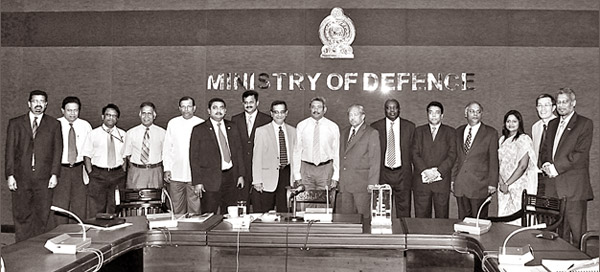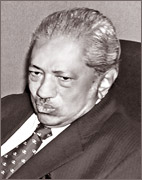Mutual respect, goodwill - the need of the hour - Dato Kulasegaran
By Ananth PALAKIDNAR
The world is shrinking into a `global village'. Therefore race,
religion, caste and creed become immaterial in a highly globalised
system. What is important is the ability to interact not on the basis of
ethnicity but on the basis of matual respect, character, merit and
goodwill. That is what matters in a country of multi ethnicity, says
President of the Federation of Malaysian Sri Lanka Organisations (FOMSO)
Dato S. Kulasegaran, who is a Malaysian of Lankan origin. His Federation
is here to assist in humanitarian activities and to explore the
possibility of investing in various projects in the island. Excerpts of
the interview
 |
|
Federation of Malaysian Sri
Lankan organisation (FOMSO) member are seen here with Defence
Secretary Gotabaya Rajapaksa |
Q: What is the intention of your visit to Sri Lanka?
A: The delegation to Sri Lanka has been organised by the
Federation of Malaysian Sri Lankan Organisations (FOMSO) which began in
2006 and has been registered in Malaysia.
The Federation comprises eighteen Malaysian and Lankan organisations
made up of Malaysians of Lankan origin. I am the President of the FOMSO.
Our fourteen member delegation has arrived in the island with two
objectives.
The first objective is to provide humanitarian assistance. We will be
handing over medical assistance worth US $ 150,000 to victims of the
recent floods in Batticaloa. Apart from medical assistance, computers
and stationery for schools in the North and East will also be donated.
The second objective is exploring the possibility of making
investments in various projects in the island.
Q: What are the areas in which your delegation is wanting to
invest in Sri Lanka?
A: The delegation first visited Sri Lanka soon after the three
decades of conflict which ended in 2009. Since then several visits were
made to the island by our delegation. However, this time around, the
delegation is exploring the possibility of making investments in various
development projects. We have been focusing on investing in
communication, low cost housing, oil and gas, a cement plant, solar
power, a green technology park and a hotel project.
Q: What is your observation on the post-conflict atmosphere in
Sri Lanka as far as trade and investments are concerned?
|

Dato S. Kulasegaran |
A: With the end of the three decades of civil strife, a stable
atmosphere prevails in Sri Lanka for investments, trade and tourism.
Since we understood the potential in Sri Lanka for business investments,
the interaction between our federation and the Lankan government was
initiated by us through the Lankan mission in Malaysia. The government
of Sri Lanka has been very supportive, accommodative and receptive to
our business proposals.
The government is supplying us with information and assistance with
regard to the projects we are looking forward to launch in Sri Lanka.
Therefore with the end of the conflict, business can move forward,
infrastructure could be put in place with the enhancement of
communication facilities.
Sri Lanka being a small country, is easily manageable as far as
business and investment ventures are concerned.
Q: Malaysia is multi ethnic. How are the issues of the
minorities addressed in Malaysia?
A: Relations among races in Malaysia is very good. We are one
nation. The unity of our country is now embodied in the slogan `Malaysia
truly Asia'. The issues of the minorities are addressed in real terms
with partnership in the political sector, business and in the social
sector. Therefore stability in all these sectors remains the fundamental
factor in the success of Malaysia.
Q: Being the President of the Federation of the Malaysian Sri
Lankan Organizations which comprises a considerable number of Malaysian
Tamils of Lankan origin, how do you see the Lankan Tamil issue?
A: Frankly speaking I do not like to get drawn into ethnic
issues. I see ethnicity as an incidence of destiny. We do not ask to be
born as Tamils, Sinhalese, Chinese, Malays or whatever. This is divine.
The important thing is how we get along with each other. The root cause
of ethnic conflicts is nothing but ignorance. Now we are living in an
era with rapid transformation in every aspect.
The world is shrinking into a `global village'. Therefore race,
religion, region, caste and creed become immaterial in a highly
globalised system. In the ultimate analysis, what is important is the
ability of mankind interacting with each other not on the basis of
ethnicity but on the basis of respect, character, merit and goodwill.
That is what matters in a country of multi ethnicity.
Q: Could you give details of the meetings you had in Sri Lanka
and the outcome of these meetings?
A: As I told you earlier, the meetings we had in Sri Lanka
were very fruitful and constructive. Our federation was formed in 2006
and now we are here for the sixth time since the conflict ended in 2009.
We do not have any political agenda. We met ministers, secretaries,
senior officials and members of the business community. What we could
understand is that Sri Lanka is on the path of rapid development.
Several foreign investors are showing a keen interest on launching new
business and industrial projects.
Lankan officials we have met were very receptive and interaction with
them was positive with regard to our intended plans for Sri Lanka. We
are in the process of coming out with good deals.
Q: Is there any plan mooted by your federation to improve the
tourist sector between Malaysia and Sri Lanka?
A: Of course Sri Lanka has a lot of potential as far as
tourism is concerned. However, to improve the tourism sector,
infrastructure such as the development of highways, bridges and
transportation should be improved significantly. For instance travelling
to the North and East by road is a big time consuming affair. Therefore
if air transportation from Colombo to the distance cities such as Jaffna
and Batticaloa are improved the business fraternity will show greater
interest in enhancing their activities.
We agree there are marvellous locations for tourism in the island.
But to make them more vibrant, infrastructure should be improved. We are
also focusing on coming out with new hotel projects.
We have plans to encourage travellers from Malaysia to Sri Lanka. On
the other hand, proper marketing strategies should be adopted to make
Sri Lanka a good tourist destination internationally.
I would like to mention that our association FOMSO has already sent
two groups of tourists from Malaysia. They were drawn from our
association to see the island. The volume of visitors to Sri Lanka from
Malaysia has increased in recent years.
Q: How do Malaysians see Sri Lanka as a holiday destination?
A: The people of Sri Lankan origin living in Malaysia want to
come and see the places of their origins. Several of them have relatives
in Jaffna.
On the other hand, business tourism and eco-tourism could also be
promoted on a big scale. So what I would like to say is that Sri Lanka
has to do a lot more to publicise that the conflict in the island is now
over.
More action should be taken to inform the outside world through web
sites about the peaceful conditions within the country and accessibility
to trade and business sectors in the island.
Measures must be taken to attract expatriates in the post-conflict
development process in the island. The emotional attachment of the
diaspora should be tapped in order to make them more involved in the
development of the country.
Q: What is your observation on the state of the economic
conditions in Asia, particularly on the massive progress in India and
China. Where does Sri Lanka stand in this new economic trend in Asia?
A: This is the century of Asia. This was waiting to happen.
This part of the world has two large countries in terms of
population-China and India. Half the world population is in Asia.The
number of people means productivity. So the people of these countries
are more involved in productivity. Sri Lanka whether it likes it or not
will get drawn into this.
Though Sri Lanka is a small country compared to India and China, the
island nation could utilise whatever its resources to its best. The
prime resource is human resource. So if you have an intelligent
workforce you could develop the country in a big way. |

